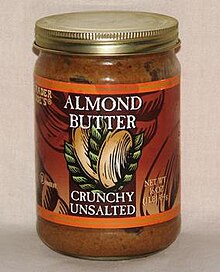This article has multiple issues. Please help
improve it or discuss these issues on the
talk page. (
Learn how and when to remove these template messages)
|

Trader Joe's store brand almond butter | |
| Type | Spread |
|---|---|
| Main ingredients | Almonds |
Almond butter is a food paste made from grinding almonds into a nut butter. Almond butter may be "crunchy" or "smooth", and is generally "stir" (susceptible to oil separation) or "no-stir" ( emulsified). Almond butter may be either raw or roasted, but this describes the almonds themselves, prior to grinding.
Compared to peanut butter
Almond butter is an alternative to peanut butter for those with peanut allergies or who dislike the taste of peanuts. Almond butter contains significantly more fiber, calcium, potassium, iron, and manganese than peanut butter, [1] and about half the saturated fat, [2] although a slightly higher total fat content. Almonds, a type of tree nut, are not legumes, whereas peanuts are, so almond butter can be consumed by those looking to avoid legumes.
Nutrition
| Nutritional value per 100 g (3.5 oz) | |
|---|---|
| Energy | 2,648 kJ (633 kcal) |
21 g | |
| Dietary fiber | 3.7 g |
59 g | |
| Saturated | 5.6 g |
| Monounsaturated | 38.3 g |
| Polyunsaturated | 12.4 g |
15 g | |
| Minerals | Quantity
%DV† |
| Zinc | 27% 3 mg |
| †Percentages estimated using US recommendations for adults, [3] except for potassium, which is estimated based on expert recommendation from the National Academies. [4] | |
Almond butter is high in monounsaturated fats, [5] calcium, potassium, iron and manganese. [1] It is considered a good source of riboflavin, phosphorus, and copper, [1] and an excellent source of vitamin E, [6] magnesium, and fiber. [5] Almond butter also provides dietary protein.
See also
References
- ^ a b c USDA.gov Archived 2011-10-22 at the Wayback Machine Sunflower Seed Butter and Almond Butter as Nutrient-Rich Alternatives to Peanut Butter
- ^ Jenny Sugar. "Nutritional Comparison of Peanut Butter and Almond Butter". POPSUGAR Fitness. Archived from the original on 24 December 2013. Retrieved 18 September 2015.
- ^ United States Food and Drug Administration (2024). "Daily Value on the Nutrition and Supplement Facts Labels". Retrieved 2024-03-28.
-
^ National Academies of Sciences, Engineering, and Medicine; Health and Medicine Division; Food and Nutrition Board; Committee to Review the Dietary Reference Intakes for Sodium and Potassium (2019). Oria, Maria; Harrison, Meghan; Stallings, Virginia A. (eds.).
Dietary Reference Intakes for Sodium and Potassium. The National Academies Collection: Reports funded by National Institutes of Health. Washington (DC): National Academies Press (US).
ISBN
978-0-309-48834-1.
PMID
30844154.
{{ cite book}}: CS1 maint: multiple names: authors list ( link) - ^ a b "Calories in Almonds - Nutrition and Health Facts". About.com. Archived from the original on 31 March 2014. Retrieved 18 September 2015.
- ^ Vitamin E and Minerals: Eye Nutrition from Nuts Archived 2010-07-01 at the Wayback Machine - AllAboutVision.com